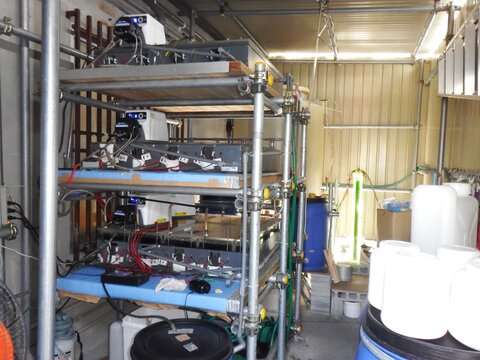BioAlchemy: Treating wastewater at the point of production

Treating wastewater is an arduous process relying on complex sewage systems and treatment plants. While this is easier in developed areas with the requisite infrastructure, providing such services in rural areas is challenging. In recent years, decentralizing wastewater treatment—using devices to treat water locally—is increasingly seen as a preferable alternative.
BioAlchemy is the newest startup from the Okinawa Institute of Science and Technology Graduate University (OIST) and builds local wastewater treatment devices. The company was born from OIST's Biological Systems Unit, led by Professor Igor Goryanin, and is now supporting businesses in Okinawa. With new wastewater limits imposed by the Okinawa Prefectural Government, many businesses are now seeking better alternatives. BioAlchemy's devices allow businesses to save on wastewater costs—and use those savings to grow.
Their devices rely on microbial fuel cell, or MFC, technology, using anaerobic bacteria that feed on different compounds found in wastewater. As the bacteria consume these compounds, these impurities are removed from the wastewater—producing clean water that can either be reused or safely discharged. MFCs can function using very little power, allowing the technology to be used in remote locations.
"We are grateful for funding from the Japan Science and Technology Agency's START Program and the Okinawa Prefectural Government which allowed us to build our prototypes," says BioAlchemy CEO Dr. Tomoharu Inoue. "We also extend our thanks to OIST's Technology Development and Innovation Center and its Proof-of-Concept Program for helping us bring the idea from lab to business."
No wasted opportunity
OIST Technology Development and Innovation Center (TDIC)'s Proof-of-Concept Program gave the BioAlchemy team access to mentorship, entrepreneurial training, and business expertise. They currently hold three patents and have created many prototype devices—including a model that is the largest of its kind. These devices are now being tested by distilleries, factories, and food producers.
Next, the startup will expand the abilities of the MFCs into bioelectrical systems that can generate electricity. The devices will soon be able to remove additional types of wastewater impurities—including ammonia and phosphate. With additional pending patents in the pipeline, the team can start to build new devices to serve more diverse industries in Japan and across the globe.
"Clean water and sanitation is one of the United Nations Sustainable Development Goals—and a top priority in our society," says Professor Igor Goryanin. "Our research lab at OIST will continue to work with BioAlchemy to further develop and commercialize this technology."
Provided by Okinawa Institute of Science and Technology


















